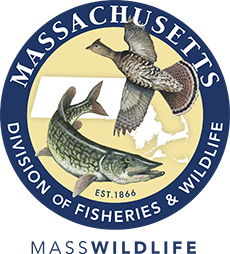- Division of Fisheries and Wildlife
Media Contact for Wild turkeys: A conservation success story
Media Contact, MassWildlife
For many Massachusetts residents who see turkeys regularly, it might be hard to believe that these birds were once absent from the state. Learn about the reintroduction efforts and brush up on your turkey trivia just in time for Thanksgiving!
History
When the Pilgrims first arrived in Massachusetts in 1620, wild turkeys were found throughout most of the state. European settlers hunted turkeys for food and cleared the land for buildings, firewood, and agriculture which greatly changed the turkey’s natural habitat. By 1800, turkeys were quite rare in Massachusetts, and they had disappeared by 1851.
Reintroduction efforts
As the turkey populations nationwide bottomed out, many states tried to reestablish these valuable birds in their historic habitats. Between 1911 and 1967, at least 9 unsuccessful attempts were made to restore turkeys to Massachusetts. In 1937, the Federal Aid in Wildlife Restoration Act, also known as the Pittman-Robertson Act, provided much-needed funding for wildlife studies and restoration. With the additional resources, wildlife management methods improved and new capture techniques provided a safe and effective means for live-capture of birds for translocating to new areas.
Following the example of successful reintroductions in other states, 37 wild turkeys were live-trapped in southwestern New York and released in southern Berkshire County in the early 1970s. By the fall of 1978, the new flock had grown to about 1,000 birds across the nearly optimal habitat in Berkshire and Franklin counties!
MassWildlife biologists and volunteers began live-trapping turkeys from these growing populations and transporting them to other areas of the state with suitable habitat. Between 1979 and 1996, a total of 26 releases of 561 turkeys were made in 10 counties. These turkeys established populations that continued to grow on their own and turkeys rebounded statewide.
Turkeys today
The turkey population in Massachusetts is now estimated to be 30,000–35,000. Turkeys are found everywhere in Massachusetts (except Nantucket) thanks to an abundance of suitable habitat. Turkeys thrive in forested and agricultural habitats, but also exist in suburban and urban environments.
Wild turkeys are now the most popular game bird in Massachusetts. Each year, about 15,000 licensed hunters take to the field during two designated turkey seasons to enjoy the outdoors and provide meat for their families.
Fun facts about turkeys
-
Wild turkeys can be found in 49 states, including Hawaii. Turkeys were not historically found in Alaska and it is the only state without wild turkeys today.
-
Wild turkeys can and do fly. Even though birds can sometimes weigh over 25 pounds, their strong muscles and wings allow them powerful flight over short distances. Adults rarely fly with continuous wingbeats for more than about 1/8 mile.
-
Newly hatched baby turkeys are called “poults”. Once they are a couple months old, juvenile males are called “jakes” and juvenile females are called “jennies”.
-
The most famous sound that turkeys make is the “gobble” but there are at least 28 different known calls made by the wild turkey.
-
Turkey was served at the first Thanksgiving, but it was not the center of the meal. According to the journals of Pilgrims, it was just one of many different game birds served that day.
